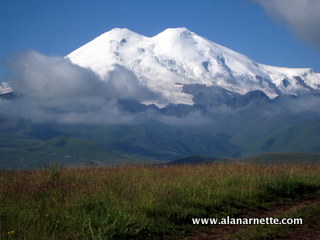 Summited
August 11, 2011 Summited
August 11, 2011
Europe: Elbrus (18,513'/5642m)
 Mount
Elbrus is an extinct volcano in the Caucasus Main Range, the European border with
Asia in southern Russia. Mt. Elbrus has two main summits - the western summit at
18,513'/5642m and the eastern summit at 18,442'/5621m.The first ascent of the west
peak was in 1829 by a Russian army team and the east in 1874 by an English team.
Mont Blanc is sometimes consider the highest in Europe but Elbrus technically holds
that honor. Mount
Elbrus is an extinct volcano in the Caucasus Main Range, the European border with
Asia in southern Russia. Mt. Elbrus has two main summits - the western summit at
18,513'/5642m and the eastern summit at 18,442'/5621m.The first ascent of the west
peak was in 1829 by a Russian army team and the east in 1874 by an English team.
Mont Blanc is sometimes consider the highest in Europe but Elbrus technically holds
that honor.
The normal climbing season is May to September. The climb is quite short by 7
Summits standards taking less than a week at most. I will be climbing from the north
side using a base camp and a High Camp from where we will launch the summit bid.
This side offers more of a climbing experience and is significantly less crowded.
The standard route on Elbrus' south is technically easy and includes a cable
car up to the 12,500' level. It is snow slope from there to the summit. Climber stay
in 'huts' which are single room, rock walled building with tin roofs at 12,700' and/or
the Barrel Huts, 13,600', which are, well, huge barrels. A snow-cat is reported to
be available for climbers who want a ride even higher - up to 15,750. It is common
to have over 100 climbers going for the summit in a single day in July.
As with most mountains that have a reputation for being easy, they are also deadly
and Elbrus is no exception. About 25 climbers die each year due to ill-preparedness
or the weather. It can be extremely cold and windy. However literally thousands of
people have summited Elbrus included a Soviet team in 1956 of 400 climbers!
The second highest mountain in Europe, Dychtau in Russia at 17,077'/5205m and
is 40 miles southeast of Elbrus. It considered a very dangerous and technical climb
with the main peak accessible from a steep and narrow ridge from the adjacent saddle.
Elbrus Resources:
|

